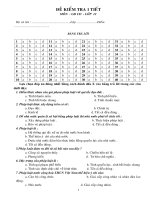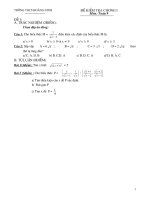- Trang chủ >>
- Văn Mẫu >>
- Văn Nghị Luận
Kiem tra 1 tiet
Bạn đang xem bản rút gọn của tài liệu. Xem và tải ngay bản đầy đủ của tài liệu tại đây (65.15 KB, 4 trang )
TEST 3
I.
Choose the word whose underlined part is pronounced differently from others.
1.
A. fund
B. underline
C. upset
D. sugar
2.
A. tire
B. mine
C. habit
D. wife
3.
A. happy
B. recycle
C. sky
D. why
4.
A. seat
B. deaf
C. steam
D. mean
II. Choose the correct answer:
1.
My father .................... smoke but now he doesn’t.
A. use to
2.
D. are used to
B. in order for
C. so that
D. in order that
C. bring
D. do
Could you ........................... me a favor?
A. give
4.
C. used to
He does morning exercise regularly .................... improve his health.
A. so as to
3.
B. didn’t used to
B. make
He tries to learn ....................... heart new words.
A. by
B. in
C. for
D. at
IV. Supply the correct form of verbs in brackets.
1.
She enjoys (cook).................. dinner.
2.
What about (visit).................. Ngan this afternoon?
V. Read the story. Then answer the questions.
Every year, people in many countries learn English. Some of them are young children.
Others are teenagers. Many are adults. Some learn at school. Others learn by themselves. A
few learn English just by hearing the language in films, on television, in the office or among
their friends. But not many are lucky enough to do that. Most people must work hard to learn
English.
Why do all these people learn English? It’s not difficult to answer this question. Many
boys and girls learn English at school because it is one of their subjects. Many adults learn
English because it is useful for their work. Teenagers often learn English for their higher
studies because some of their books are in English at the college or university. Other people
learn English because they want to read newspapers or magazines in English
1.
How must most people work to learn English?
.............................................................................................................................................
2.
Do people only learn English at school?
.............................................................................................................................................
3.
Why do many adults learn English?
.............................................................................................................................................
4.
Do teenagers often learn English for their higher studies?
.............................................................................................................................................
5.
People in a lot of nations learn English (True or False?)...............
6.
Teenagers often learn English for their higher studies because they want to read
newspapers or magazines in English (True or False?).................
VI. Rewrite the sentences:
1.
“Can you open the door?” Nga said to Hoa.
Nga asked Hoa.....................................................................................................................
2.
“Wait for me.” She said to her friend.
She told her friend...............................................................................................................
3.
“You should study harder next semester.” The teacher said to me.
The teacher said I.................................................................................................................
VII. Complete these sentences:
1.
received / last month/ my first semester / I
................................................................................................................................................
2.
for/ good grades/ He / English/ got/ Math / and /................................................................................................................................................
TEST 3
I.
Choose the word whose underlined part is pronounced differently from others.
1.
A. fund
B. underline
C. upset
D. sugar
2.
A. tire
B. mine
C. habit
D. wife
3.
A. happy
B. recycle
C. sky
D. why
4.
A. seat
B. deaf
C. steam
D. mean
II. Choose the correct answer:
1.
My father .................... smoke but now he doesn’t.
A. use to
2.
D. are used to
B. in order for
C. so that
D. in order that
C. bring
D. do
Could you ........................... me a favor?
A. give
4.
C. used to
He does morning exercise regularly .................... improve his health.
A. so as to
3.
B. didn’t used to
B. make
He tries to learn ....................... heart new words.
A. by
B. in
C. for
D. at
IV. Supply the correct form of verbs in brackets.
1.
She enjoys cooking dinner.
2.
What about visiting Ngan this afternoon?
V. Read the story. Then answer the questions.
Every year, people in many countries learn English. Some of them are young children.
Others are teenagers. Many are adults. Some learn at school. Others learn by themselves. A
few learn English just by hearing the language in films, on television, in the office or among
their friends. But not many are lucky enough to do that. Most people must work hard to learn
English.
Why do all these people learn English? It’s not difficult to answer this question. Many
boys and girls learn English at school because it is one of their subjects. Many adults learn
English because it is useful for their work. Teenagers often learn English for their higher
studies because some of their books are in English at the college or university. Other people
learn English because they want to read newspapers or magazines in English
1.
How must most people work to learn English?
Most people must work hard to learn English.
2.
Do people only learn English at school?
No, they don’t.
3.
Why do many adults learn English?
Many adults learn English because it is useful for their work.
4.
Do teenagers often learn English for their higher studies?
Yes, they do
5.
People in a lot of nations learn English TRUE
6.
Teenagers often learn English for their higher studies because they want to read
newspapers or magazines in English FALSE
VI. Rewrite the sentences:
1.
“Can you open the door?” Nga said to Hoa.
Nga asked Hoa to open the door.
2.
“Wait for me.” She said to her friend.
She told her friend to wait for her.
3.
“You should study harder next semester.” The teacher said to me.
The teacher said I should study harder the next semester.
VII. Complete these sentences:
1.
received / last month/ my first semester / I
I received my first semester last month.
2.
for/ good grades/ He / English/ got/ Math / and /He got good grades for Math and English.









